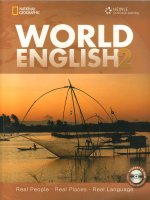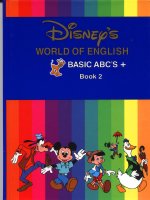Correct english 2 potx
Bạn đang xem bản rút gọn của tài liệu. Xem và tải ngay bản đầy đủ của tài liệu tại đây (141.96 KB, 6 trang )
Published by How To Books Ltd, 3 Newtec Place,
Magdalen Road, Oxford OX4 1RE. United Kingdom.
Tel: (01865) 793806. Fax: (01865) 248780.
email:
www.howtobooks.co.uk
All rights reserved. No part of this work may be reproduced
or stored in an information retrieval system (other than for
purposes of review) without the express permission of the
publisher in writing.
# Copyright 2002 Angela Burt
First edition 2000
Second edition 2002
Angela Burt has asserted the right to be identified as the author
of this work, in accordance with the Copyright, Designs and
Patents Act 1988.
British Library Cataloguing in Publication Data
A catalogue record for this book is available from the British
Library.
Cover Design by Baseline Arts, Oxford
Produced for How To Books by Deer Park Productions
Typeset by PDQ Typesetting, Stoke-on-Trent, Staffs.
Printed and bound by The Cromwell Press, Trowbridge,
Wiltshire
NOTE: The material contained in this book is set out in good
faith for general guidance and no liability can be accepted
for loss or expense incurred as a r esult of relying in particular
circumstances on statements made in the book. Laws and
regulations are complex and liable to change, and readers
should check the current position with the relevant authorities
before making personal arrangements.
Introduction
The A–Z of Correct English is a reference book which has been
written for the student and the general reader. It aims to tackle the
basic questions about spelling, punctuation, grammar and word usage
that the student and the general reader are likely to ask.
Throughout the book there are clear explanations, and exemplar
sentences where they are needed. When it’s helpful to draw
attention to spelling rules and patterns, these are given so that the
reader is further empowered to deal with hundreds of related words.
The aim always has been to make the reader more confident and
increasingly self-reliant.
This is a fast-track reference book. It is not a dictionary although,
like a dictionary, it is arranged alphabetically. It concentrates on
problem areas; it anticipates difficulties; it invites cross-references. By
exploring punctuation, for example, and paragraphing, it goes far
beyond a dictionary’s terms of reference. It is not intended to
replace a dictionary; it rather supplements it.
Once, in an evening class, one of my adult students said, ‘If
there’s a right way to spell a word, I want to know it.’ On another
occasion, at the end of a punctuation session on possessive
apostrophes, a college student said rather angrily, ‘Why wasn’t I told
this years ago?’
This book has been written to answer all the questions that my
students over the years have needed to ask. I hope all who now use
it will have their questions answered also and enjoy the confidence
and the mastery that this will bring.
Angela Burt
v
This page intentionally left blank
How to use this book
For ease of reference, all the entries in this book have been listed
alphabetically rather than being divided into separate spelling, usage,
punctuation and grammar sections.
You will therefore find hypocrisy following hyphens;
paragraphing following paraffin; who or whom? following
whiskey or whisky?; and so on.
WANT TO CHECK A SPELLING?
Cross-referencing will help you locate words with tricky initial
letters.
aquaint Wrong spelling. See
ACQUAINT.
Plural words are given alongside singular nouns, with cross-
referencing to relevant rules and patterns.
knife (singular) knives (plural). See
PLURALS (v).
There is also a general section on plurals and another on foreign
plurals.
If it’s the complication of adding an ending that is causing you
trouble, you will find some words listed with a useful cross-
reference.
dining or dinni ng? dine + ing = dining (as in dining room)
din + ing = dinning (noise dinning in ears)
See
ADDING ENDINGS (i) and (ii).
There are individual entries for confusing endings like -able/-ible;
-ance,-ant/-ence,-ent; -cal/-cle; -ise or -ize? and for confusing
beginnings like ante-/anti-; for-/fore-; hyper-/hypo-; inter-/intra-
and many others.
vii
A
abandon abandoned, abandoning, abandonment
(not -bb-)
abattoir (not -bb-)
abbreviate abbreviated, abbreviating, abbreviation
(not -b-)
abbreviations See
CONTRACTIONS.
-able/-ible Adjectives ending in -able or -ible can be
difficult to spell because both endings
sound identical. You’ll always need to be
on guard with these words and check
each word individually when you are in
doubt, but here are some useful
guidelines:
(i) Generally use -able when the
companion word ends in -ation:
abominable, abomination
irritable, irritation
(ii) Generally use -ible when the
companion word ends in -ion:
comprehensible, comprehension
digestible, digestion
(iii) Use -able after hard c and hard g:
practicable (c sounds like k)
navigable (hard g)
(iv) Use -ible after soft c and soft g:
forcible (c sounds like s)
legible (g sounds like j)
See also
ADDING ENDINGS (ii); SOFT C AND
SOFT G.
1
abridgement/ Both spellings are correct. Use either but be
abridgment consistent within one piece of writing.
abscess This is a favourite word in spelling
quizzes.
(not absess or abcess)
absence absent (not absc-)
absolute absolutely (not absoloute, absoloutely)
absorb absorption. Notice how b changes to p
here.
abstract nouns See
NOUNS.
accept or except? We ACCEPT your apology.
Everybody was there EXCEPT Stephen.
accessary If you want to preserve the traditional
or accessory? distinction in meaning between these two
words, use ACCESSARY to refer to
someone associated with a crime and
ACCESSORY to refer to something that is
added (a fashion accessory or car
accessories). However, the distinction has
now become blurred and it is perfectly
acceptable to use one spelling to cover
both meanings. Of the two, accessory is
the more widely used, but both are
correct.
accessible (not -able)
accidentally The adverb is formed by adding -ly to
accidental.
(not accidently)
accommodation This is a favourite word in spelling quizzes
and is frequently seen misspelt on painted
signs.
(not accomodation or accommadation)
accross Wrong spelling. See
ACROSS.
accumulate (not -mm-)
ABRIDGEMENT/ABRIDGMENT
2









